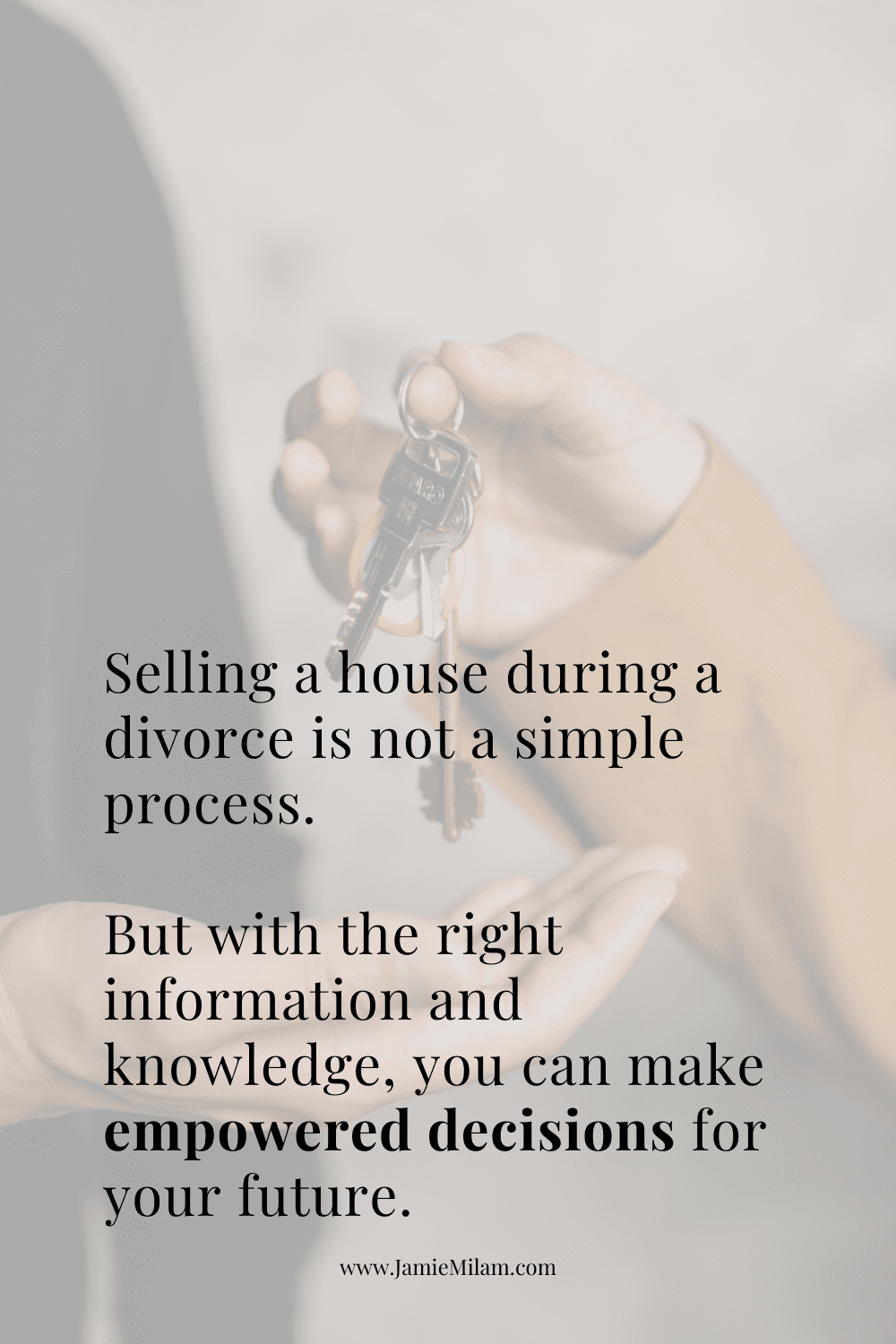THE BLOG
THE BLOG
*This website uses affiliate links which may earn a commission at no additional cost to you. As an Amazon addict and Associate, I earn from qualifying purchases, but I'm only recommending products I love!
Browse More Blog Posts:


Selling Your Home in a Divorce
3 Key Areas to Determine Your Next Steps
Divorce impacts millions of Americans a year. So if you are experiencing divorce, know that you're not alone in asking big questions like: What's next? Where do I start in this process? How do I protect my kids? And, a big one—What do we do with the house?
Divorce is complex. Even the most amicable split has nuances and challenges and tough choices. And the decision to either keep or sell your house in a divorce is a big one. Then, once you decide to go for it, how do you actually do it?
Here we'll explore selling your house in a divorce and offer tips on addressing the emotional, legal, and practical sides of the process, plus offer some next steps to help you move for
Deciding To Sell Your House in a Divorce
Because of the personal, financial, and legal aspects of owning a home, deciding to sell it during a divorce is a big decision.
There are many factors that need to be considered about the marital home in the divorce. They boil down to three key choices:
- Keep the house and leave the title and mortgage how they are.
- Transfer the title and mortgage to the party who wants to stay in the house.
- Sell the house.
Deciding between these options has both a personal angle—who wants to live in the house? Are kids involved? How does moving impact your life?—and a practical angle—who holds the title and mortgage? Can you afford to carry a mortgage yourself?
The rest of the article assumes you've decided on option #3 as the best route to take: you're selling.
(For a full breakdown of the options for your house in a divorce, listen to episodes 54 and 55 of The Determined AF podcast or read the blog post on your three post-divorce mortgage options).
So You've Decided to Sell Your House—Now What?


While you may have a myriad of emotions related to selling your marital home (all valid, all allowed), selling your home ultimately offers a fresh start in your post-divorce life. The goal is to move through the process as smoothly as possible so you can get that fresh start you deserve!
Note that it is impossible to cover every detail here (don't worry, I covered even more of it in my free eBook, Selling Your House in a Divorce), so we'll focus on three areas to consider so you can get a handle on your next steps:
- The emotional and relational side of selling your house in a divorce
- The legal and financial side of selling your house in a divorce
- The practical and real estate-related side of selling your house in a divorce
So, here's what you need to consider when selling your house in a divorce.
1. Mindset Matters
Before diving into all the legal and financial complexities of selling your home in a divorce, it's important to start with your mindset. Why? Because it helps you approach things with your best foot forward, ensuring a better outcome.
It's common and normal to experience many emotions during the sale of a family home even when a divorce isn't applicable, but especially so when it is. You may be angry, sad, sentimental, or disappointed. There's room for these emotions, and ensuring you're taking care of yourself through therapy, self-reflective processing, and connecting with your community is so important.
It's also important to remember one simple cliche: this too shall pass. It can all feel big and overwhelming, but the house will sell and the divorce will go through—your life will move forward.
Something else to consider here is the relational aspect of selling your home in a divorce. Even if you and your ex are not on good terms, communication is key in achieving the best possible outcome for the sale of a home. Keeping both spouses in the communication loop is essential during this process. It's something you should expect from your real estate agent, no matter which of you selected the agent to work with. This can still be achieved while keeping your personal thoughts and concerns confidential.
Keeping these things in mind, here are some next steps:
- Honor your feelings: Even though a divorce process can keep you busy, it's important to carve out some time to honor and process your feelings. This could be as simple as a 15-minute meditation or journaling session in the morning, but it could also include making an appointment with a counselor, connecting with friends more regularly, or joining an online community of women experiencing the same thing as you.
- Commit to communication: Prioritize communication with your ex and your real estate agent, lawyer, and any other professional involved in this process. Make sure your agent has the contact information for your attorney in case they need to gain clarity on anything. Have a conversation with your ex about this and share how important it is to you to keep these open lines of communication. If yours is a high conflict case, know that your agent may need to involve your mediator or a divorce coach to help get you both to the finish line.
- Set some realistic expectations: Don't hesitate to share with your real estate professional the questions you have about the process. Outline for them any deadlines that have to be met to honor your divorce agreement. Discuss with them any concerns you have about showings, especially if your children are having a hard time adjusting to the idea of a transition. Let them be a part of your team to make this as seamless as possible.
We often rush ahead with our to-do list without taking time to tend to our inner world—our emotions and mindset of it all. While you're moving through this process of selling your house in a divorce, don't neglect you.
2. Legal and Financial Considerations
The next big area to consider is the logistics of selling your house. Before you can list it or consider upgrades that make it more attractive to buyers, you need to know the options available to you and your ex.
This comes down to legal and financial considerations. Here are some things you need to consider:
- State laws: Some states are considered "community property" states (assets acquired during marriage are considered community property) and others are "equitable distribution" states (property acquired will be distributed equitably - not necessarily evenly). This—and court orders that protect marital property and your personal situations—all determine who gets what in a divorce.
- Ownership: You'll need to understand your state laws on marital interest in the property, because it can certainly affect how you can legally sell your house and transfer title. Even if the title to the home is only in one person's name, if you are still legally married, some states will require both spouses to sign the purchase contract and the transfer of the deed. North Carolina is one of these states ("one to buy, two to sell").
- Financial Implications: You need to ensure that payments are still being made to the mortgage company. Don't let conflict be the cause for one of your biggest assets (if not the biggest) to move into foreclosure, which will remain on your credit report for the next seven years. That kind of note will have a lasting impact on your credit score, making it hard to qualify for another mortgage and even securing a rental property. You can get a legal temporary order for financial support to ensure these payments are being made.


Additionally, you need to be aware of the equity of the home, or the amount of value over and above what you own on the home. Equity is the marital asset that will be divided between you and your spouse whether you sell or one party keeps it.
The best way to handle these complex issues is to disconnect emotionally and move forward in a businesslike manner. This first means gathering your divorce team of professionals who specialize in this area. You want to work with lawyers and real estate agents who know the intricacies of the process.
Your lawyer will guide you through a marital settlement agreement, which specifies things like:
- Who will have use and possession of the marital home during the process
- Who is responsible for listing, showing, and selling the home plus the upkeep and mortgage payments throughout the process.
- The timeline for selling the home and steps to take if this doesn't happen.
- How additional expenses (i.e., landscaping, replacing appliances) will be handled.
- Any additional debts that need to be paid via the proceeds and how the proceeds are to be ultimately divided
By thinking through both an ideal scenario and the not-so-ideal-but-possible scenarios, you can have a firm agreement on how to move forward. This helps all parties know their responsibilities and move forward.
With these things in mind, here are some of your next steps:
- Know the details: If you're not sure about who is listed on the title, how your mortgage is structured, or what the equity of the home is—find out! You can find the title by checking county records, asking the closing attorney, or doing a title search. Same thing with your state's laws—look into what they are and how they can impact your situation.
- Find your team: Creating your marital settlement agreement is key to moving forward with selling your house during a divorce. Make sure you find a lawyer you trust and who is an expert in divorce. You can use the divorce directory of professionals available within the P.E.A.C.E. of Mind Initiative, a community to support women before, during, and after divorce. Make sure that you are consulting with real estate professionals who also specialize in divorce to help you navigate equity and other areas.
Because the legal and financial side of selling a house during a divorce is complex, you need a clear head. That's why it's so important to first address your emotions and carve out space to process those things. Then, come into this part in a businesslike manner, figuring out the details piece-by-piece with a trusted team.
3. Making Your House Sellable


Time to sell. This is where you'll want to work with a real estate agent who is both trustworthy and knowledgeable about sales during a divorce.
Realtors® who focus specifically on helping people going through a divorce are known as Certified Divorce Specialists® and have been trained in the legal and financial aspects of a divorce. Working with someone who knows this will ensure clients have the step-by-step guidance to both sell their house and ensure they're protected legally and financially.
Your Realtor® will first help you value the home, using one of many potential approaches: comparative market analysis, professional appraisal, or a broker price opinion. It's important to not only rely on an appraisal that you or your spouse's attorney may order.
Appraisers aren't walking homes with buyers on a weekly basis to know what they see value in or not. Sometimes they label a value to a home that truly needs significant repairs, updates and decluttering to actually sell for that price to a buyer.
A good agent will consider how to increase the value and curb appeal of your home so it can sell as fast as possible and for the highest amount possible. Here are some important ways to do this:
- Market the best features: What makes your house unique? It could be sweeping views, an amazing location, a shady backyard, or an interesting design. It may be the location and the lifestyle it can offer. Focus on those things and market them well.
- Create curb appeal: This refers to the attractiveness of a property for sale and its surroundings when viewed from the street. To make your home eye-catching to buyers, you can make some simple improvements like cutting the grass, putting down fresh mulch, power-washing the exterior, giving it a fresh coat of paint, and cleaning up clutter.
- Stage the inside: The goal of staging a home is to make it appeal to the highest number of potential buyers. You do this by creating an eye-catching, clean, and modern look so that buyers can picture themselves in the home. This is achieved with major decluttering, no personal items, neutral colors, simple decor, and furniture that fits the space.
- Upgrade with ROI in mind: Sometimes investing in renovations or upgrades can command a much higher sales price and, therefore, profit. While you may not want to start ripping out walls or taking on huge projects during a divorce process, small upgrades can command a big ROI. Some simple renovations with high ROI include: replacing appliances (especially with energy-efficient appliances), painting cabinets, updating hardware, improving lighting, increasing storage space, and refreshing paint. Your agent can advise you on where to get the most bang for your buck so you don't waste your time, money and energy.
Making your home as attractive as possible sets you up for a quicker sale and higher profit. However, it's important not to rush through this process. Selling your home during a divorce can be difficult because you need to work cooperatively with your ex. With that in mind, don't gloss over these serious considerations:
- Selling your home before you are qualified for another: Again, don't rush the process. Ensure you can buy something new (if you want that) before completing the sale of your house if that's what you desire. If you're relying on spousal support financially, there are very specific requirements that need to be included in your agreement to ensure that can happen.
- Guessing your mortgage payoff: The balance you see on your statement isn't the true payoff. Be aware of penalties that may be involved by paying off your mortgage. You also want to be certain there aren't any additional liens or judgements attached to your property. Those must be paid off (even if out of proceeds) in order to transfer title to a new owner.
- Underestimating closing costs: Closing attorney fees, taxes, transfer stamps and commissions all add up and need to be factored into the equation. A seasoned real estate agent will be able to offer a more accurate estimate of your total closing costs.
- Being inflexible with showings: You really can't say "no" to a showing, so get your home in show-ready condition and keep it that way so that unexpected showings don't send you into a panic. If you have an uncooperative spouse, the court can step in and issue an order to assist with this.
This is a non-exhaustive list of considerations, but provides some food for thought to move forward. Here are some action steps to take for the sale of your house during a divorce:
- Vet your Realtor®: This is the most important thing you can do in the process of selling a home during a divorce. Get a professional who knows the nuances of divorce and can guide you through the process. (Remember, the P.E.A.C.E. of Mind Initiative has a vetted directory of professionals to work with).
- Determine your priorities: If you and your ex can work together collaboratively to make upgrades to your home for resale, do so. If it's going to be highly contentious, your priority might be making the sale as soon as possible. Whatever your situation, determine your priorities so you can move forward with a concrete plan.
Selling a house during a divorce is not a simple process. But with the right information and knowledge, you can make empowered decisions for your future.
To dive even deeper into everything you need to know about selling your house in a divorce, get your free copy of Selling Your House in a Divorce. This comprehensive resource has insider home-selling tips from a Certified Divorce Specialist® Realtor® with extensive experience in this arena.
To selling your house & starting fresh,



Save this post to come back to or share with a friend!
**Disclosure** This post may contain affiliate links and they are at no additional cost to you, though I may earn a small commission. Don't worry, I only recommend products or services that I have tried or believe would be of great value to you! All opinions expressed are those of my own!
Let’s Connect
So Many More Things to Share
The show that empowers women to make aligned decisions before, during & beyond divorce.
Where we are determined to empower women to live the lives they desire and deserve by making informed decisions & taking aligned action.
Inspiring and educating women on everything from mindset to real estate, divorce and entrepreneurial systems. I believe in the power of awareness and how it is instrumental on guiding each of us to make strategized decisions that align with our authentic self.
A cost effective way to renovate your space with professionally curated designs and available sourced products simulated into your space. Perfect for those who need the eye of an interior designer, without the full services & the cost that comes with it.
P.E.A.C.E. of Mind Initiative aims to be the resource center that inspires and supports women to feel Prepared, Educated, Assured, Confident, and Empowered before, during & beyond divorce. A growing resource of guides, checklists & professional directory.
There's More ▾
There's More ▾
Let me share the goods!
Come from contribution, that's a motto I've valued for years! So... that's exactly what I am to provide you, straight into your inbox each week! No fluff and all open-book. Inspiring you to practice awareness, value your authentic self, and implement strategic actions so you can create alignment in your world to live the life you desire and deserve!











